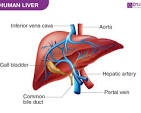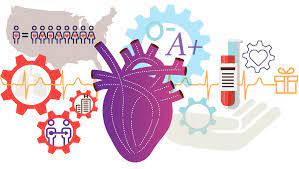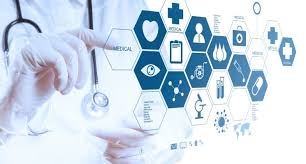
Unlocking the Secrets of Liver Health: A Guide to Optimal Well-Being
The Importance of the Liver in Human Health
The liver is a vital organ that plays a crucial role in maintaining overall human health. Located in the upper right side of the abdomen, the liver is responsible for performing a wide range of functions that are essential for our well-being.
One of the primary functions of the liver is to detoxify harmful substances from the body, including drugs, alcohol, and environmental toxins. It acts as a filter, removing these toxins and ensuring that our blood remains clean and free from impurities.
Furthermore, the liver is involved in metabolizing nutrients from food, such as proteins, fats, and carbohydrates. It stores essential vitamins and minerals, regulates blood sugar levels, and produces bile to aid in digestion.
In addition to its metabolic functions, the liver also plays a critical role in immune system support. It helps to fight infections by producing proteins that combat pathogens and remove bacteria from the bloodstream.
Unfortunately, the liver is susceptible to various diseases and conditions that can impact its function. Hepatitis, fatty liver disease, cirrhosis, and liver cancer are among the common disorders that can affect this vital organ.
It is important to maintain a healthy lifestyle to support optimal liver function. Eating a balanced diet rich in fruits, vegetables, whole grains, and lean proteins can help keep your liver healthy. Limiting alcohol consumption and avoiding exposure to toxic substances are also crucial for maintaining liver health.
If you experience symptoms such as abdominal pain, jaundice (yellowing of the skin or eyes), fatigue, or unexplained weight loss, it is important to consult a healthcare provider promptly for evaluation and treatment.
Remember that caring for your liver is essential for your overall well-being. By understanding its importance and taking proactive steps to support its health, you can ensure that this vital organ continues to function optimally and contribute to your overall health.
8 Essential Tips for Maintaining a Healthy Liver
- Limit alcohol consumption to keep your liver healthy.
- Maintain a healthy weight to reduce the risk of fatty liver disease.
- Eat a balanced diet rich in fruits, vegetables, and whole grains for liver health.
- Stay hydrated by drinking an adequate amount of water daily.
- Exercise regularly to promote liver function and overall health.
- Avoid exposure to toxins and chemicals that can harm the liver.
- Get vaccinated against hepatitis A and B to protect your liver from infections.
- Consult with a healthcare provider regularly for liver health screenings and check-ups.
Limit alcohol consumption to keep your liver healthy.
Limiting alcohol consumption is a key tip for maintaining a healthy liver. Excessive alcohol intake can lead to liver damage, including inflammation, fatty liver disease, and cirrhosis. By moderating alcohol consumption, you can reduce the strain on your liver and lower the risk of developing serious liver conditions. Opting for non-alcoholic beverages or consuming alcohol in moderation can help protect your liver and support its vital functions in detoxification and overall health maintenance.
Maintain a healthy weight to reduce the risk of fatty liver disease.
Maintaining a healthy weight is crucial in reducing the risk of fatty liver disease. Excess body weight, especially around the abdomen, can contribute to the accumulation of fat in the liver, leading to fatty liver disease. By adopting a balanced diet and engaging in regular physical activity to achieve and sustain a healthy weight, individuals can help protect their liver health and reduce the likelihood of developing this potentially serious condition. Prioritizing weight management is a proactive step towards safeguarding liver function and overall well-being.
Eat a balanced diet rich in fruits, vegetables, and whole grains for liver health.
Consuming a balanced diet that is abundant in fruits, vegetables, and whole grains is a key tip for maintaining optimal liver health. These nutrient-rich foods provide essential vitamins, minerals, antioxidants, and fiber that support the liver’s detoxification processes and overall function. Fruits and vegetables such as berries, leafy greens, citrus fruits, and cruciferous vegetables are particularly beneficial for liver health due to their high content of vitamins and antioxidants. Whole grains like brown rice, quinoa, and oats offer complex carbohydrates that provide sustained energy and promote digestive health. By incorporating these wholesome foods into your daily diet, you can help nourish your liver and enhance its ability to perform its vital functions effectively.
Stay hydrated by drinking an adequate amount of water daily.
Staying hydrated by drinking an adequate amount of water daily is crucial for supporting liver function and overall health. Water plays a key role in helping the liver flush out toxins and waste products from the body, ensuring that it can perform its detoxification functions efficiently. By maintaining proper hydration levels, you can help optimize liver function and promote overall well-being. Remember to make water your beverage of choice throughout the day to keep your liver healthy and functioning at its best.
Exercise regularly to promote liver function and overall health.
Regular exercise is a key factor in promoting optimal liver function and maintaining overall health. Physical activity helps improve blood flow to the liver, allowing it to efficiently process nutrients and toxins. Exercise also aids in reducing liver fat, lowering the risk of fatty liver disease. By incorporating regular exercise into your routine, you can support your liver’s vital functions and contribute to your overall well-being.
Avoid exposure to toxins and chemicals that can harm the liver.
It is crucial to prioritize liver health by avoiding exposure to toxins and harmful chemicals that can adversely affect this vital organ. By being mindful of environmental factors, such as limiting alcohol consumption, reducing exposure to pesticides, and avoiding tobacco smoke, individuals can safeguard their liver from potential damage. Taking proactive steps to minimize toxin exposure plays a significant role in maintaining optimal liver function and overall well-being.
Get vaccinated against hepatitis A and B to protect your liver from infections.
Getting vaccinated against hepatitis A and B is a crucial step in safeguarding your liver from potentially harmful infections. Hepatitis viruses can cause serious damage to the liver, leading to conditions such as liver inflammation and cirrhosis. By receiving the appropriate vaccinations, you can significantly reduce your risk of contracting these infections and protect the overall health and function of your liver. Consult with your healthcare provider to determine the recommended vaccination schedule for hepatitis A and B to ensure optimal protection for your liver.
Consult with a healthcare provider regularly for liver health screenings and check-ups.
It is crucial to prioritize your liver health by scheduling regular screenings and check-ups with a healthcare provider. By consulting with a medical professional on a routine basis, you can proactively monitor the condition of your liver and address any potential issues early on. These screenings can help detect liver diseases or abnormalities at an early stage when they are more manageable and treatable. Taking proactive steps to care for your liver through regular check-ups is key to maintaining optimal health and well-being.



